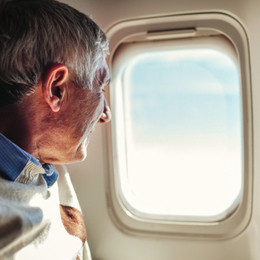
World Tour
How travel and the outdoors make us better people.
Anyone who has spent any time watching PBS or patrolling the travel section of their favorite bookstore likely knows the name Rick Steves.
Although he’s an American, he’s probably more familiar with several European towns and cities than most people are with the neighborhoods they call home. Steves started traveling to Europe as a teenager, but he’s been going back—and expanding his worldview—ever since. Today he’s a popular TV host, a bestselling guidebook author, and an outspoken activist who encourages Americans to broaden their perspectives through travel. He speaks from decades of personal experience.
Seeing new places and meeting new faces may be baked into Steves’s job, but he believes doing so accomplishes several other goals, such as stimulating creativity, spurring gratitude, and gaining newfound appreciation for fellow humans whose backgrounds and perspectives differ from his own.
In other words, travel has made him a different person. One might even say a better one.
Consider travel a form of self-care, especially as we age. More frequent annual vacations seem to have a direct positive effect on mortality, according to a study published in Psychosomatic Medicine, with vacationers significantly less likely to die of heart disease. Other studies have shown that travel alleviates stress and buttresses our mental health.
Whether due to good genes, good habits, or a combination of the two, some people manage to stay “on the move” into their 80s and beyond. For those who have issues with flexibility and mobility, travel remains a distinct possibility, though perhaps with minor modifications. Experts suggest choosing travel destinations that can be navigated easily, or traveling in groups and/or opting for cruises that can accommodate specific needs.
Other good advice: Don’t ruminate on the inconveniences that are part and parcel of travel: navigating airports, dealing with traffic in unfamiliar places, finding accessible restrooms, etc. To begin with, airports can provide complimentary wheelchair service, when and if needed, and most destinations can accommodate special needs, especially when those needs are communicated ahead of time. It might be helpful to alter our mindset as we embark on trips, realizing that we may have to travel differently than we did when we were younger.
Just as getting out of town offers its share of benefits, so does spending time outside. Each helps to take our minds off our worries and disappointments, and gives us an appreciation for the fact that the world is far bigger and grander than the problems of the day.
Outdoor activities such as walking, gardening, and birdwatching do the body and the brain good: boosting energy, improving memory, and reducing the risks of osteoporosis and rheumatoid arthritis, among other benefits. Getting outside also helps us remain physically active, which improves balance and motor skills, and promotes cardiovascular health. Some evidence suggests it can even reduce cancer risk.
Consider solving two problems at the same time by traveling to destinations known for their natural beauty. My wife and I will be doing just that later this year when we abscond to Switzerland for our first-ever trip to Europe. That said, one need not travel halfway around the world to reap the benefits that come from seeing new places and experiencing the awe that comes with it.
Published (and copyrighted) in Suburban Life, April 2024


